Recognizing the need for mobilizing competent and motivated leaders who will champion the initiation and facilitation of complex change processes in addressing climate change in Southeast Asia, the Southeast Asian Regional Center for Graduate Study and Research in Agriculture (SEARCA) and the Deutsche Gessellschaft für Internationale Zusammenarbeit (GIZ) GmBH-Climate-Smart Land Use in ASEAN (CSLU) Project kicked off the second virtual offering of the ASEAN Climate Leadership Programme (ACLP) on 18-19 August 2021 via the SEARCA Online Learning and Virtual Engagement (SOLVE) platform. This year’s ACLP will run for 15 days over a two-and-a-half-month period (until 28 October 2021). It has the overarching theme of promoting climate-smart land use for implementing Nationally Determined Contributions (NDCs), which is a core component of the Paris Agreement.The Paris Agreement is a landmark international treaty adopted by 196 Parties during the twenty-first session of the Conference of the Parties (COP) held on December 2015 in Paris France. The 196 negotiating Parties committed to substantially reduce global greenhouse gas emissions and to strengthen those commitments over time.
 Leadership facilitators, organizers, and participants pose for a group photo to officially launch ACLP 2021.
Leadership facilitators, organizers, and participants pose for a group photo to officially launch ACLP 2021.
Designed as a Leadership Journey, the programme gathered 23 participants from eight ASEAN Member States, namely, Brunei Darussalam, Cambodia, Indonesia, Malaysia, Myanmar, the Philippines, Thailand, and Vietnam. Throughout the programme, participants are expected to bring their diverse background and expertise into use as they embark on a leadership journey towards enhanced competencies, organizational skills, and understanding of regional policy processes, particularly those related to sustainable land use, climate change mitigation and adaptation, and attainment of the Sustainable Development Goals. The programme aims to assist participants in achieving these goals by strengthening their key leadership skills in initiating and facilitating change processes and collective cross-sectoral transformative action in climate-smart land use. It is hoped that this will enable participants to enhance their contribution to promoting the implementation of climate-friendly and resilient land use practices towards achieving NDCs within the context of ASEAN policies and priorities.
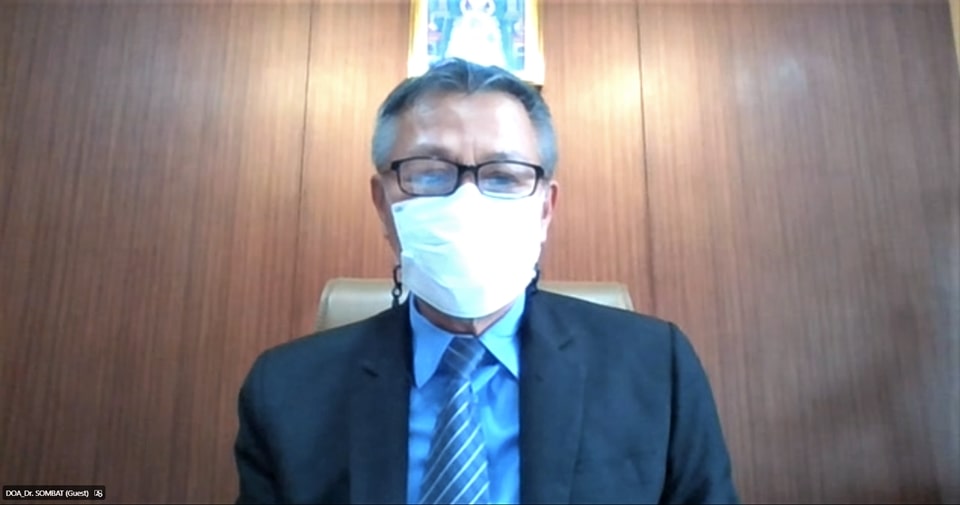 Dr. Sombat Tongtau, Deputy Director General of the Department of Agriculture, Thailand, delivers his welcome remarks. He emphasizes the need for ASEAN member states to work together across sectors both at the national and regional level to increase their resilience to climate change.
Dr. Sombat Tongtau, Deputy Director General of the Department of Agriculture, Thailand, delivers his welcome remarks. He emphasizes the need for ASEAN member states to work together across sectors both at the national and regional level to increase their resilience to climate change.
In his opening remarks, Dr. Sombat Tongtau, Deputy Director General of the Department of Agriculture of Thailand, emphasized the need to continue and strengthen the collaborative spirit in the ASEAN, especially amid the challenges posed by climate change, which has grave regional and global implications on the lives of people and the economy, particularly the food, agriculture, and forestry sector. According to Dr. Sombat, not only do ASEAN member states need to adapt to the current situation but they should also be able to continue the commitment to and promotion of land use practices that help contribute to achieving NDCs. He said that the ACLP, as one of the initiatives that support regional efforts towards climate resilience, will “empower the participants to become leaders on transformative action against climate change and enhance food security in the region.”
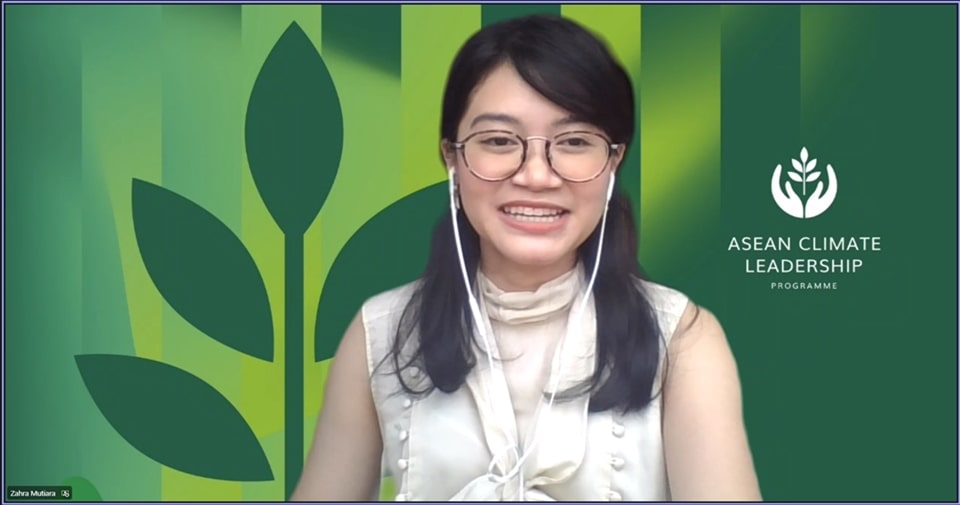 Ms. Zahra Mutiara, Advisor to the GIZ Climate-Smart Land Use in ASEAN Project, provides an overview of the project and encourages participants to use the leadership program as an avenue to expand their network.
Ms. Zahra Mutiara, Advisor to the GIZ Climate-Smart Land Use in ASEAN Project, provides an overview of the project and encourages participants to use the leadership program as an avenue to expand their network.
Ms. Zahra Mutiara, Advisor for the GIZ CSLU Project, said that the project aims to support the ASEAN in strengthening its coordinating role to develop and implement policies that ensure the promotion of climate change mitigation and adaptation in the land use sector. In relation to this, Ms. Mutiara stated that ACLP will provide participants with a review of climate-smart practices in the land use sector and introduce them to tools and framework that could help them become more effective leaders during policy formulation and implementation. She also hoped that the program would serve as a great avenue for participants to expand their network at the regional level and, in the future, take proactive roles in facilitating cross-cutting coordination in their respective national contexts as well as in the context of Southeast Asia.
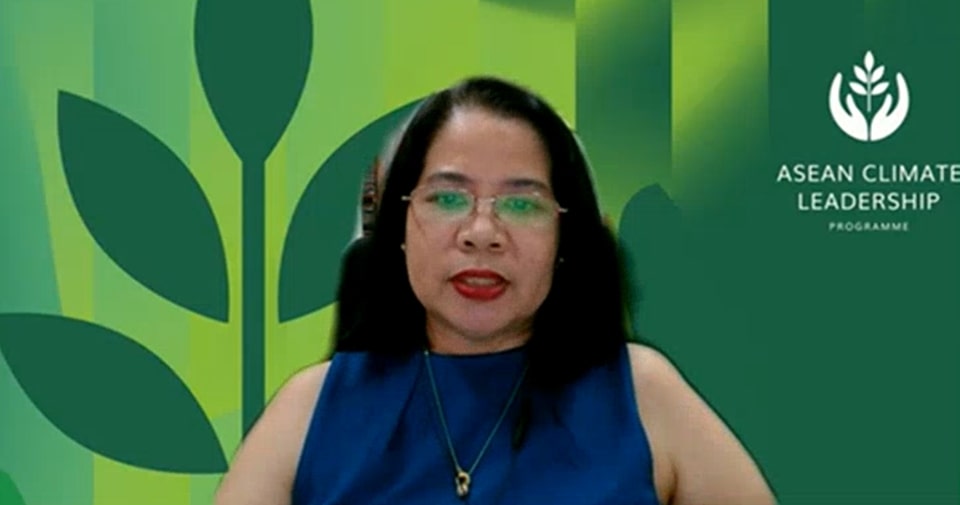 Dr. Nova A. Ramos, Head, Education and Collective Learning Department-Training for Development Unit of SEARCA, underscores the importance of the ACLP as part of larger efforts to take urgent action to combat climate change and its impacts through enhanced agricultural and rural development towards climate resilience.
Dr. Nova A. Ramos, Head, Education and Collective Learning Department-Training for Development Unit of SEARCA, underscores the importance of the ACLP as part of larger efforts to take urgent action to combat climate change and its impacts through enhanced agricultural and rural development towards climate resilience.
Dr. Nova A. Ramos, Head, Education and Collective Learning Department-Training for Development Unit (ECLD-T4DU) of SEARCA, said that despite the global pandemic and its subsequent economic crisis, the impacts of extreme climate continue to increase in frequency and severity, thus necessitating continued and strengthened collaboration to increase the resilience of ASEAN countries. Dr. Ramos furthered that SEARCA’s 11th Five-Year Plan, with its overarching theme of Accelerating Transformation Through Agricultural Innovation or ATTAIN, puts premium on collaboration and partnerships. SEARCA has collaborated with GIZ on numerous research programs and capacity building initiatives on climate change, most recently the ACLP. Dr. Ramos concluded her message by echoing SEARCA’s belief that the leadership program will “lead the forestry, agriculture, and fisheries sector to a better, bigger, and smarter climate-smart land use that is highly relevant in the ASEAN region.”
The ACLP is divided into four modules that feature all or a combination of four elements, namely, theoretical foundation, strengthening personal leadership, observing climate-smart land use, and working on a change project. Each module consists of a leadership component and thematic highlights of climate-smart land use.
The recently concluded Module 1 (Introduction to the ACLP) featured lectures on land use and climate change; climate-smart land uses; and ASEAN priorities and guidelines on climate-smart agriculture, particularly in the food, agriculture, and forestry sector. Module 1 also introduced participants to the ACLP leadership model, with focus on leadership in the context of personal skills set that enables individuals to initiate and manage change, as well as the four dimensions of leadership and formulation of individual leadership development plans. Succeeding sessions of the leadership programme will discuss various topics on leadership and climate-smart land use, as follows: Module 2 (Strengthening Your Knowledge Base); Module 3 (Sensing, Presencing, and Prototyping); and Module 4 (Closing the Journey).
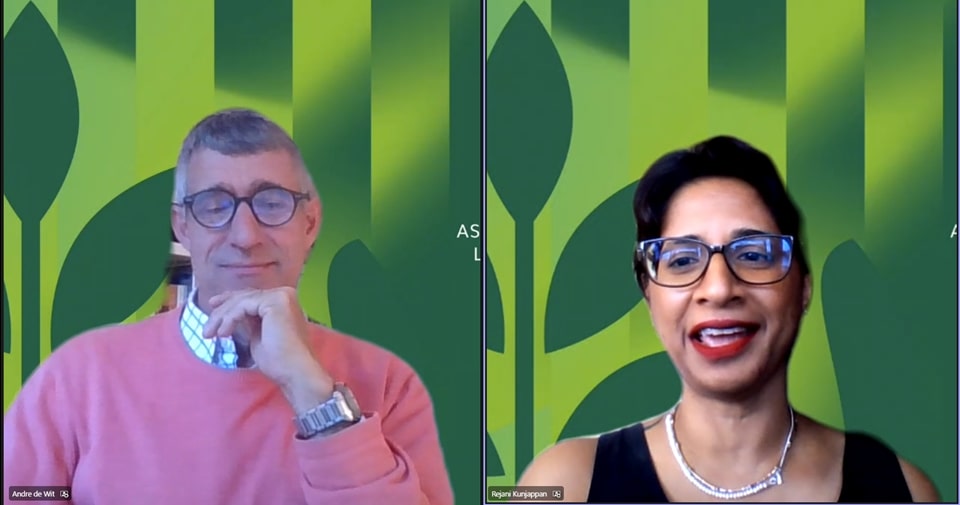 Mr. Adre de Wit (left), Dean of the Amsterdam Leadership Academy, Netherlands, and Ms. Rejani Kunjappan (right), Senior Technical Officer at the Center for People and Forest (RECOFTC)-The Center for People and Forests, Thailand, serve as co-facilitators of the leadership program sessions.
Mr. Adre de Wit (left), Dean of the Amsterdam Leadership Academy, Netherlands, and Ms. Rejani Kunjappan (right), Senior Technical Officer at the Center for People and Forest (RECOFTC)-The Center for People and Forests, Thailand, serve as co-facilitators of the leadership program sessions.
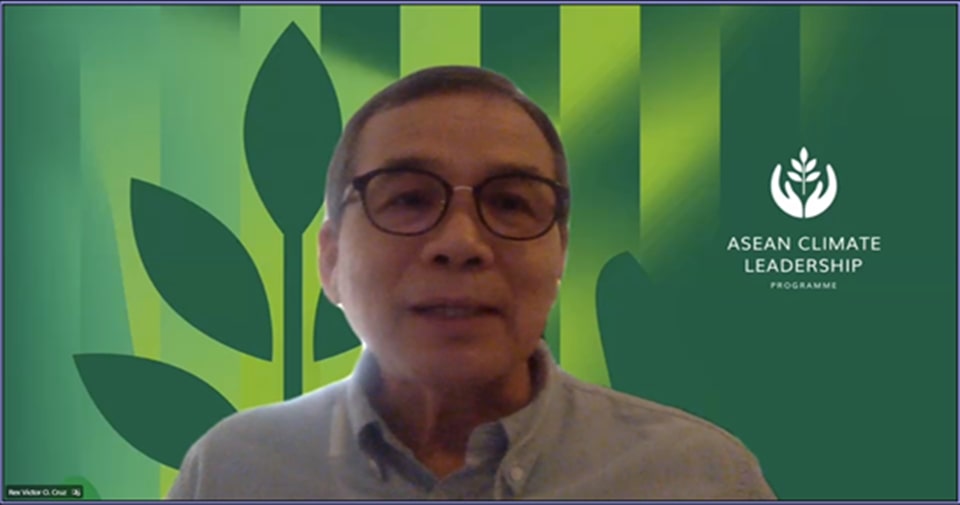 Dr. Rex Victor O. Cruz, Professor and Director, Environmental Forestry Programme, College of Forestry and Natural Resources University of the Philippines Los Baños, serves as Technical Expert of ACLP 2021.
Dr. Rex Victor O. Cruz, Professor and Director, Environmental Forestry Programme, College of Forestry and Natural Resources University of the Philippines Los Baños, serves as Technical Expert of ACLP 2021.
Mr. Adre de Wit, Dean of the Amsterdam Leadership Academy, Netherlands, and Ms. Rejani Kunjappan, Senior Technical Officer at the Center for People and Forest (RECOFTC)-The Center for People and Forests, Thailand, will jointly serve as Leadership Facilitators together with the programme’s Technical Expert, Dr. Rex Victor O. Cruz, Professor and Scientist, Institute of Renewable Natural Resources, College of Forestry and Natural Resources, University of the Philippines Los Baños. SEARCA’s Management Information Systems Unit, led by Mr. Jaymark Warren T. Dia, provides the technical backstopping for the entire duration of the ACLP 2021.